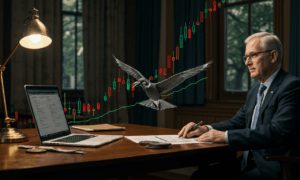ECONOMY
A look at the major economic developments that shaped the markets this week, from inflation figures to central bank decisions.
-
Inflation Shows Signs of Easing
This week brought encouraging news on the price front. The latest Consumer Price Index (CPI), a primary gauge of inflation, indicated a smaller-than-expected increase for May. This suggests that the rapid rise in the cost of everyday goods and services may be starting to slow down. For consumers, this could signal a welcome relief from the pressure on household budgets. This cooling trend is a critical piece of data that policymakers, especially at the Federal Reserve, watch very closely.
-
The Federal Reserve Holds Interest Rates Steady
In its much-anticipated meeting, the U.S. central bank, known as the Federal Reserve or the Fed, opted to keep its benchmark interest rate at its current level. This key rate influences borrowing costs across the economy, affecting everything from mortgages and car loans to credit card rates. While the decision to hold rates was widely expected, the Fed’s updated forecast caught the attention of many. The committee now projects only one interest rate cut for 2024, a reduction from the three cuts it had signaled earlier in the year. This more cautious stance implies the Fed wants to see more definitive proof that inflation is retreating before it begins to lower borrowing costs.

FINANCE
From major corporate strategy shifts in the tech world to political events moving European markets, here are the week’s top finance stories.
-
Apple Enters the AI Arena with New Strategy
Tech behemoth Apple made its long-awaited move into the generative AI space. During its annual worldwide developer conference, the company introduced Apple Intelligence, a personalized AI system that will be woven into the software of its iPhones, Macs, and other devices. A significant element of this new push is a partnership with OpenAI, which will integrate the popular ChatGPT technology directly into Apple’s ecosystem. This strategic pivot is considered essential for Apple to stay competitive against other technology giants who have already established a strong presence in artificial intelligence.
-
Political Uncertainty in Europe Shakes Markets
The outcome of the recent European Union parliamentary elections has created volatility in financial markets. A notable rise in support for right-leaning parties, especially in powerhouse nations like France, has introduced a dose of instability. This was magnified when the French President called a snap legislative election, a surprise move that heightened investor concerns. In response, the value of the Euro currency weakened, and French stock markets experienced a sharp decline. This serves as a clear reminder of how political risk can have a swift and direct impact on financial valuations.

INVESTMENTS
A review of how investors are navigating the latest economic data and corporate news, driving markets to new heights.
-
Stock Markets Reach New Peaks on Inflation News
Investors responded with strong optimism to the news that inflation was cooling more than anticipated. This positive data ignited a powerful rally in the stock market, propelling key benchmarks like the S&P 500 and the technology-focused Nasdaq to new all-time highs. Interestingly, this rally occurred despite the Federal Reserve’s signal that it would be less aggressive with rate cuts this year. The market’s reaction demonstrates that investors are currently prioritizing the immediate good news of easing inflation, which is viewed as a major positive for corporate profitability and overall economic health.
-
Broadcom Announces Strong Earnings and a Stock Split
Semiconductor company Broadcom became the latest tech giant to announce a stock split, revealing a 10-for-1 split alongside a stellar earnings report. The company, which produces critical components for the AI industry, surpassed profit expectations due to soaring demand. A stock split is a maneuver that increases a company’s number of outstanding shares while lowering the price of each individual share. It does not alter the company’s total market value, but it makes the stock appear more affordable to everyday investors. This can increase trading activity and is often interpreted as a signal of management’s confidence in future growth.
Frequently Asked Questions
Why did the stock market rally if the Federal Reserve is now planning fewer interest rate cuts?
This is an excellent question that gets to the heart of market psychology. While fewer rate cuts mean borrowing costs will stay high for longer, the market was more focused on the reason for the Fed’s caution: inflation. The inflation report released on the same day was significantly better than expected. Investors saw this cooling inflation as a more powerful and immediate positive for the economy and corporate profits. In short, the market decided that the concrete good news of lower inflation outweighed the more nuanced bad news of a more patient Fed.
What exactly is a stock split, and does it automatically make a company a better investment?
A stock split is when a company increases its number of shares to boost liquidity and lower the price of a single share. For instance, in Broadcom’s 10-for-1 split, an investor holding one share worth $1,700 would end up with ten shares worth $170 each. The total value of the investment remains the same. A split does not fundamentally change a company’s financial health or valuation. Therefore, it does not, by itself, make the company a better investment. However, splits are often done by successful companies whose stock prices have risen substantially, so they are often seen as a sign of confidence from management.



